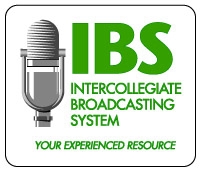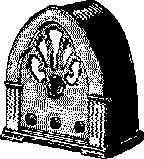

Intercollegiate Broadcasting System (IBS), your trusted experienced resource for over 70 years!
IBS is YOUR international voice for college radio and streaming audio (webcasting)!
IBS - college radio, TV, webcasting, podcasting, streaming, and high school radio!
For outstanding radio and webcasting it takes two, IBS and YOU!
Join over 1,000 IBS Member School and College Radio and Webcasters TODAY!
IBS is YOUR international voice for college radio and streaming audio (webcasting)!
IBS - college radio, TV, webcasting, podcasting, streaming, and high school radio!
For outstanding radio and webcasting it takes two, IBS and YOU!
Join over 1,000 IBS Member School and College Radio and Webcasters TODAY!
![]()
![]()
![]()

IBS coast-to-coast conferences attended by over 2,000 delegates, 200 speakers, annually will jump start your new radio station!
to download or view PDF generic IBS Member Invoice you can join/pay from.
IBS can help you start a college radio or high school radio station or streaming webcast or podcast.
For podcasting, webcasting, streaming audio and video station start up IBS can help!
How can you start a new station at your school or college?
A radio station is composed of two main parts: The studio, or source of programing, and the transmission mode.
Transmission systems are varied. IBS recommends you start your now using the easiest means of transmission. Then over time you can add the many other ways to reach listeners. Having at least one way to reach the audience allows you to build your programming team.
Some of the most popular ways for your signal to
reach listeners are:
1. Internet - audio streaming - webcasting - podcasting
2. Public Address in common areas
3. FCC licensed: FM - Education/Noncommercial or AM
4. FCC licensed LPFM (Low Power FM)(100 watts or under)
5. FCC unlicensed very low power FM or Part 15 AM
6. Cable FM, or Cable TV, on and off campus
7. Carrier current through the campus electrical system
8. Free to Air Satellite (Like XM but for FREE to listener)
When you join IBS as a member, IBS will provide your college or high school, with comprehensive help starting your radio station.
IBS membership requires an investment of $125.
Join IBS TODAY! Click here to download or view PDF generic IBS Member Invoice you can join with or pay from.
Let's assume you're interested in a noncommercial FM station, since that may be the only realistic possibility for a licensed, on-air station without coming up with the bucks to buy an existing station. First, a frequency search must be done - usually by a hired consultant - to find out if there is a freqency between 88.1 and 91.9 MHz on the FM dial available in your area which could take at least a 100-watt station (minimum) without creating or receiving interference from other stations on the same frequency or those two frequencies on either side of it. Now you know why you'll probably need a consultant to do the frequency search.
If there is no room left - and in many areas, there is no room left - your chances of getting a new on-air station are virtually none, except for buying an existing station - which usually costs well beyond whatever money you may have for this project. Then, your legal alternatives become an on-campus carrier-current AM, or cable FM piped into an existing local cable TV system or "leaky cable" which is a legal way of providing limited coverage FM. IBS can point you to more details on these alternatives.
However, if there IS a suitable frequency, you usually hire the consultant that did the frequency search to prepare an FCC application for a construction permit. Essentially, this says, here's what you'd like to build, here's the proposed programming, here's how much we estimate it will cost to build and run, and we have the money to do it. It takes some 9 to 12 months or so to get through the FCC processing. If it's clean (from an engineering/technical/legal point of view), you get a construction permit. That gives you 18 months to build.
You can then go on the air, but you must apply immediately for a license to continue to operate. The license itself is fairly routine - it's the construction permit that takes the real work.
There's a lot more to it than that, but these are the basics of the process.
If you're trying to establish a new station, you should also consider membership in the Intercollegiate Broadcasting System, IBS. We are a non-profit association and foundation of over 1,000 college radio and high school stations. IBS has protected and serve our IBS Members for over 68 years. IBS has helped hundreds of stations to get started and in their continued operation. Our email address is: IBSHQ@aol.com
There are a lot more factors to take into account. For example, will the station be licensed to the college or to another non-profit organization? Will it get free space from the college and operate like a student activity? What department will it be under - student activities or an academic department? How will it be governed and funded? Will it be open to participation only by students or will it also be open to community volunteers? What kind of program schedule do you propose? (Sketch out a sample week's worth). Can you operate during vacations and summer recess and if so, will you have enough people available to do it?
These are just some of the kinds of questions that will need to be answered. And there are a lot more details that we haven't gone into here.
Of course, hundreds of college stations have already done this, so it is not impossible. The biggest factor may be where you're located. In a major city, the chances of an availabile frequency are very low. Out in the rural areas, chances are better, but not guaranteed.
Again, for me help, get in touch with us at IBS.
Go Back to top of this page | Go back to IBS Home Page
How can you increase your station's coverage?
If you've already got a licensed noncommercial FM station, and
you want to expand the coverage, the process is similar to staking
out a new noncomm FM. First, a frequency search must be done -
usually by a hired consultant - to find out if there is room on
your present frequency or, if not, on another noncommercial
freqency between 88.1 and 91.9 MHz available in your area which
could take your proposed power at the proposed location and
height, without creating or receiving interference from other
stations on the same frequency or those a couple of places on both
sides of it.
Again, things can be very tight and available space is hard to
find in many areas. But, if you do, you usually hire the
consultant that did the frequency search to prepare an FCC
application for a construction permit. Essentially, this says,
here's what you'd like to build, here's how much we estimate it
will cost to build and run, and we have the money to do it. If
it's clean (from an engineering/technical/legal point of view),
you get a construction permit. That gives you 18 months to build.
You can then go on the air with the increased facilities, but you
must apply immediately for a license to continue to operate. The
license itself is fairly routine - it's the construction permit
that takes the real work.
Remember, with FM, both power and height count. If you maintain
the same power but increase your antenna height above average
terrain, your coverage will increase. In fact, some stations have
actually reduced their power, but increased height to a point
where they get greater coverage at less power.
Again, IBS membership can provide some of the help you'll need
along the way.
Go Back to top of this page | Go back to IBS Home Page
IBS World Headquarters: 367 Windsor Highway, New Windsor, NY 12553 Phone: 845-565-0003 FAX: 845-565-7446
Coast-to-coast across North America IBS branch offices/local telephone service are closer to YOU! (see below)
| New York City: 917-338-7572 |
Boston, MA: 617-395-7993 |
Chicago, IL: 312-235-6566 |
Washington-DC: 202-465-4340 |
| Los Angeles, CA: 213-291-1634 |
Atlanta, GA: 404-474-8884 |
San Francisco, CA: 415-738-0548 |
Seattle, WA: 206-274-4668 |
| Nashville, TN: 615-469-2400 |
St. Louis, MO: 314-754-8447 |
Tampa, FL: 813-426-3642 |
Detroit, MI: 313-281-4001 |
IBS United Kingdom call: London, England 44-2071-019-630 (Our IBS London Office serves European Union IBS College Radio)
Go to IBS First Website Page - click here!

Links and content being added - stop back and visit again.
Please send us your comments, suggestions and critiques.
Contents of this site copyright 1996 - 2012, all rights reserved by the
Intercollegiate Broadcasting System, Inc.,
367 Windsor Highway, New Windsor, NY 12553-7900
Phone: 845-565-0003
Fax: 845-565-7446
Web site design and content by
Jeff Tellis, IBS Vice President for Information Services
September 15, 1941 - March 14, 2006